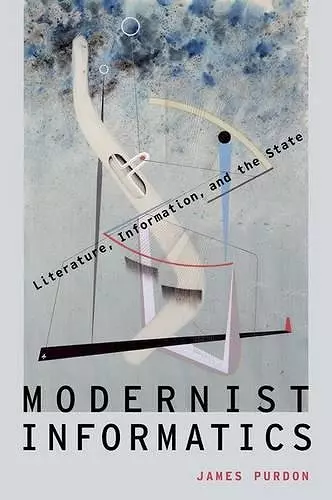Modernist Informatics
Literature, Information, and the State
Format:Hardback
Publisher:Oxford University Press Inc
Published:7th Jan '16
Currently unavailable, and unfortunately no date known when it will be back

Between steam and cybernetics lies a missing phase in the history of information culture. Beginning in the late nineteenth century, national governments and writers of fiction alike began to take an interest in information not simply as fact, nor yet as effortlessly transmissible data, but as an unusual and destabilizing new phenomenon. For some writers, such as Joseph Conrad and Walter Benjamin, 'information' came to represent not effortless transmissibility, but rather an interruption of meaningful communication. For others - such as Elizabeth Bowen - such interruptions were themselves ways of making new kinds of meaning. The attempt to reimagine and redefine information produced a range of new informatic phenomena dedicated to its control: passports, files, and identity papers; the files of Mass-Observation movement; the literal and figurative blackout procedures of the Blitz; and the government-backed 'information film'. Modernist Informatics traces the effects of these new phenomena in early twentieth-century culture, where experimental approaches to narrative and to subjectivity began to compete with government archives for the right to represent the citizens of the modern security state. It argues that information and literary narrative have a history of entanglement as well as antagonism, and that this double relation was central to the cultural shaping of modernity.
"This stylish study describes how experimental narrative forms registered the transformations and encroachments of a proliferating body of state-managed knowledge in Britain across the first half of the century. Historically meticulous, critically agile, and written with energy and flair, Modernist Informatics offers an altogether original account of modernism's civic engagements." --Marina MacKay, author of Modernism and World War II "Modernist Informatics shows how questions about the control and spread of information shaped the British cultural imaginary from the turn of the century to the Second World War. Purdon's lucid and timely study places fiction, documentary film, and the Mass-Observation movement alongside state policy and wartime censorship in their urgent concern with 'the government of information.'" --Richard Menke, author of Telegraphic Realism: Victorian Fiction and Other Information Systems "Modernist Informatics shows James Purdon to be one of the most exciting scholars to have emerged in the field of modernist studies in recent years. The book offers splendid new insights into how the mediation and governance of information was addressed in a wide range of works by major and lesser-known writers in the first half of the twentieth century." --Alex Houen, author of Terrorism and Modern Literature: From Joseph Conrad to Ciaran Carson "This is an original, expertly researched, imaginatively brilliant book, tracking information paranoia in modernist and wartime writing. The book explores the growth of a data/surveillance culture processing subjects into dossiers, informational grids, postal addresses, files and connecting Victorian systematizing of population with the IT revolution of the 1940s and 1950s by sketching forth the missing middle, the sudden expansion of classificatory procedures into modes of state biopower." --Adam Piette, author of The Literary Cold War, 1945-Vietnam "James Purdon's luminous, searching study shows how the information age had its beginning not in our digital world but in the historical interval between steam and cybernetics. He seems to have read everything written in this period, and Modernist Informatics deftly shows how information moved pervasively but often undetected between public and private domains. Tenaciously charting the intimate, intricate media ecology of official documents and weaving together themes of secrecy, ciphering, sorting, copying, monitoring, interception, and forgery, Purdon shows brilliantly how informatic processes coalesce with the formal and narrative devices of several canonical authors, the auto-anthropology of Mass-Observation, and the documentary cinema of John Grierson. An arrestingly new understanding of modernism emerges from alert and supple analyses provided in Modernist Informatics." --Steven Connor, author of Dumbstruck: A Cultural History of Ventriloquism
ISBN: 9780190211691
Dimensions: 155mm x 236mm x 23mm
Weight: 454g
242 pages